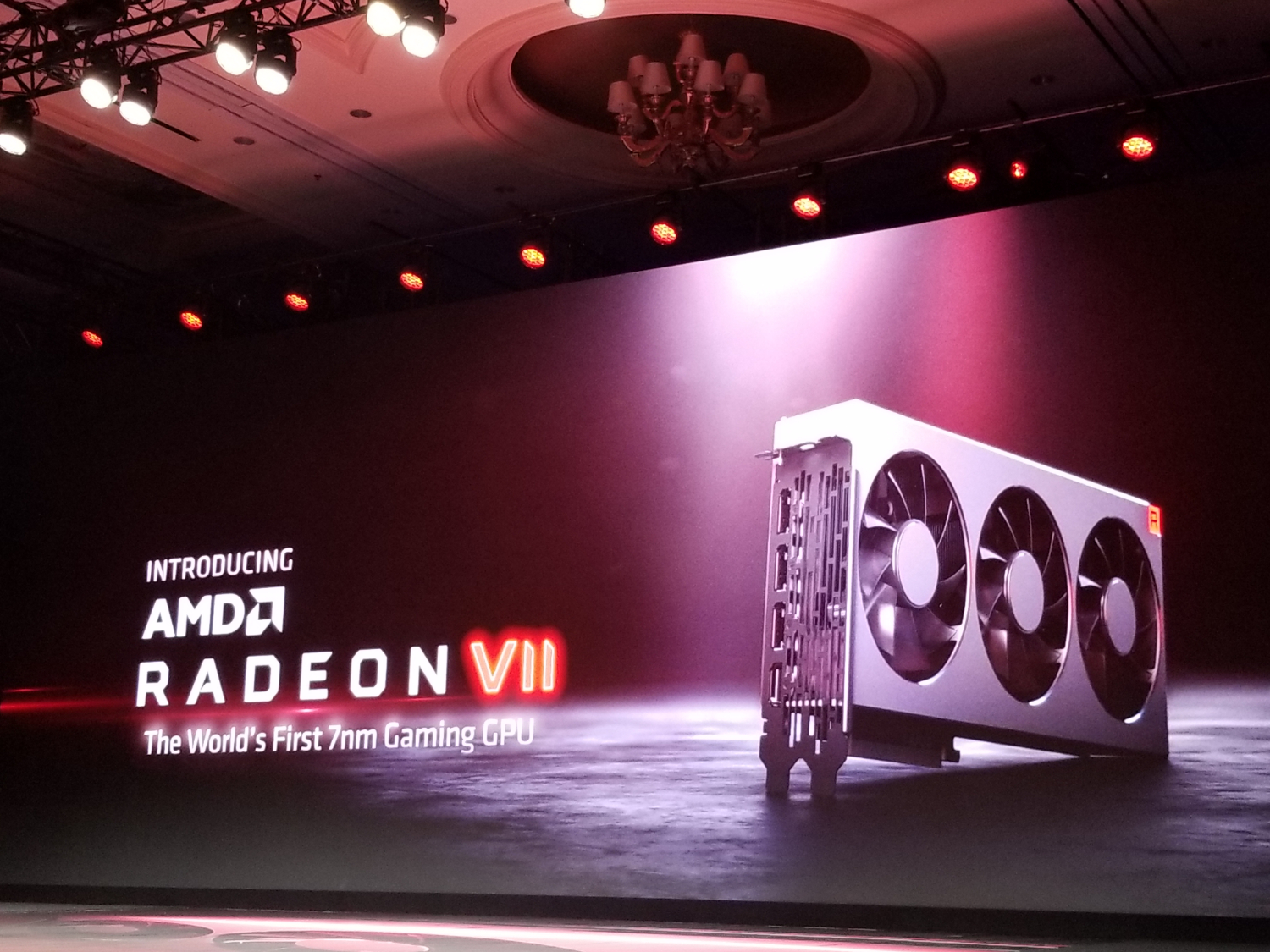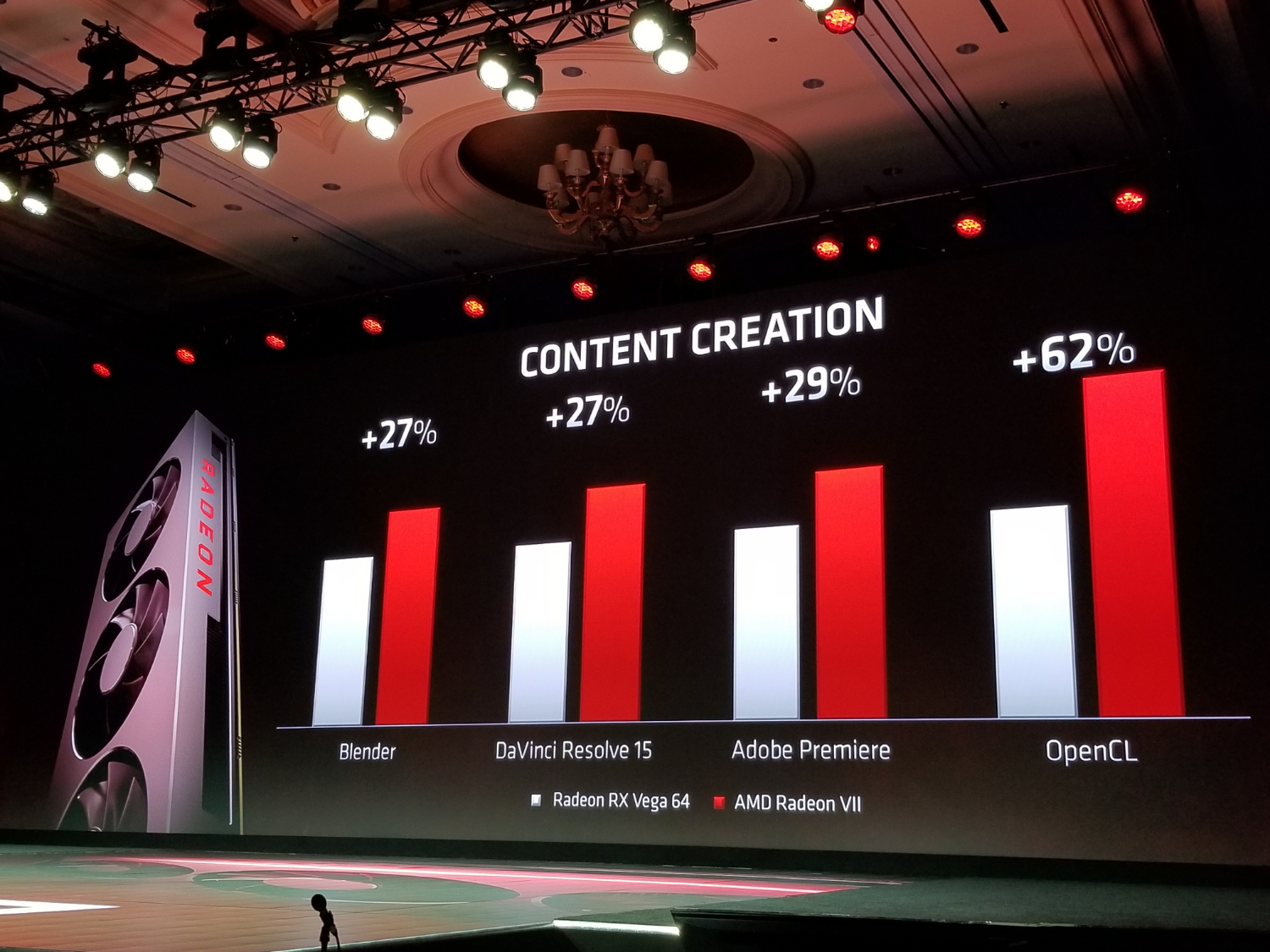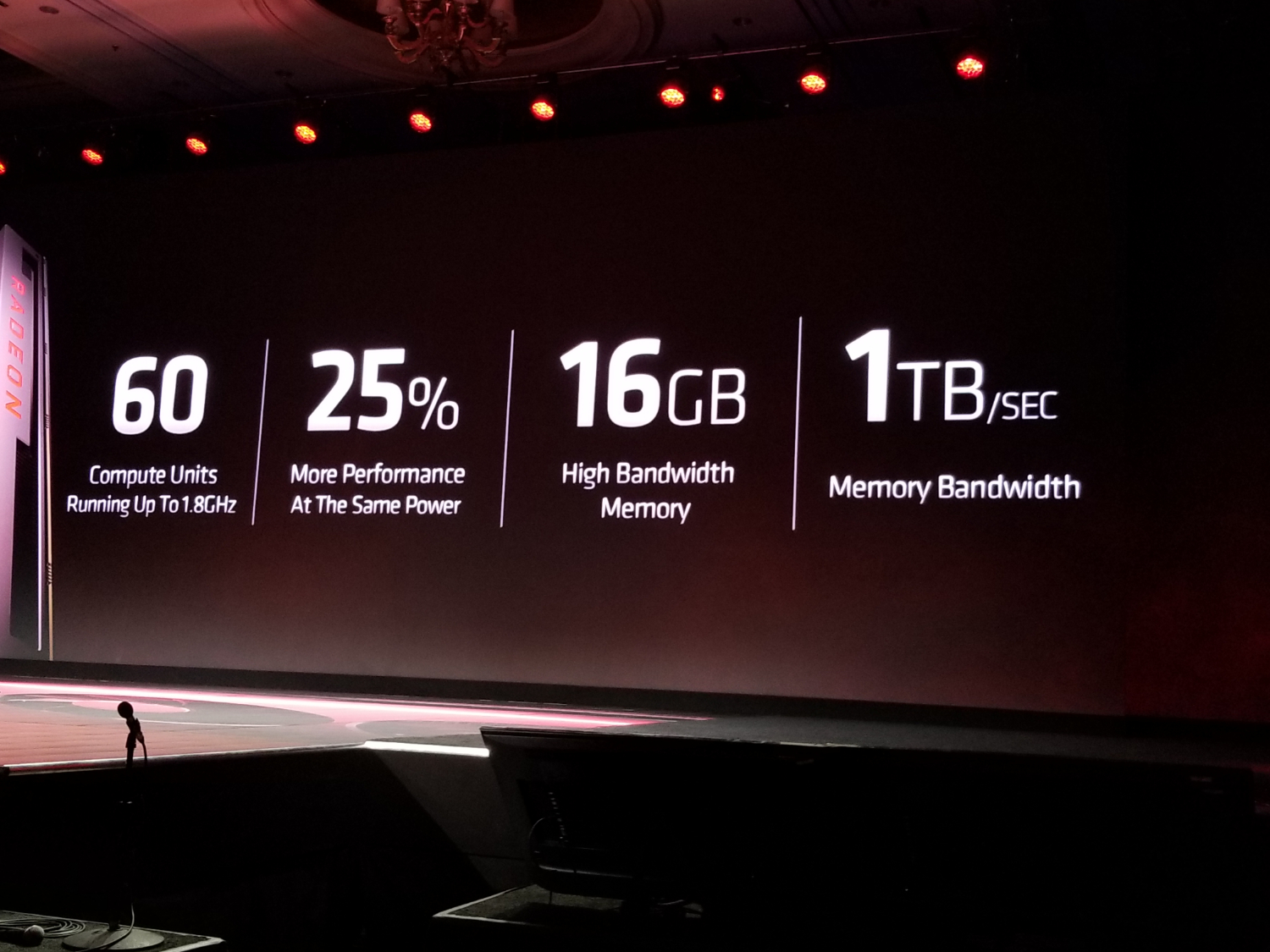AMD Unleashes The Radeon VII, World's First 7nm Gaming GPU
Today, AMD unveiled the first 7nm gaming graphics card at the company's CES 2019 keynote. Available February 7th for $699, the AMD Radeon VII promises big performance improvements over the Radeon RX Vega 64, the company's current flagship gaming GPU. The newly announced graphics card's job also includes competing against Nvidia's GeForce RTX 2080 in the high-end segment.
With twice the memory and memory bandwidth, the AMD Radeon VII claims to be up to 29 percent and 39 percent faster in gaming and demanding content creation scenarios, respectively, when compared to the Radeon RX Vega 64.
AMD Radeon VII Specifications
| Header Cell - Column 0 | AMD Radeon VII | AMD Radeon RX Vega 64 |
|---|---|---|
| Architecture (GPU) | Graphics Core Next 5.0 (Vega 20) | Graphics Core Next 5.0 (Vega 10) |
| Shaders | 3840 | 4096 |
| Peak FP32 Compute | 13.8 TFLOPS | 12.5 TFLOPS |
| Texture Units | 240 | 256 |
| Base Clock Rate | 1450 MHz | 1200 MHz |
| GPU Boost Rate | 1800 MHz | 1536 MHz |
| Memory Capacity | 16GB HBM2 | 8GB HBM2 |
| Memory Clock | 2000 Mbps* | 1890 Mbps |
| Memory Bus | 4096-bit | 2048-bit |
| Memory Bandwidth | 1024 GB/s | 483.8 GB/s |
| ROPs | 64 | 64 |
| TDP | 300W* | 295W |
| Transistor Count | 13.2 billion | 12.5 billion |
| Die Size | 331 mm² | 487 mm² |
*=unconfirmed
The AMD Radeon VII is based on AMD's second-generation Vega graphics card architecture and manufactured with TSMC's 7nm FinFET process. On paper, the Radeon VII resembles a lot like the Radeon Instinct MI50, which was one of the first graphics card to come out of the 7nm baking oven. Like the Radeon Instinct MI50, the Radeon VII sports 60 compute units resulting in 3,840 stream processors. However, the Radeon VII boasts a 1,450MHz base clock and an impressive 1.8GHz boost clock.
AMD has equipped the Radeon VII with nothing less than 16GB of high-performance HBM2 memory (second-generation High-Bandwidth Memory) across a 4096-bit memory interface. AMD stated that the Radeon VII is capable of pumping out 1 TB/s of memory bandwidth, which is twice of the Radeon RX Vega 64. The memory is probably clocked around 2,000MHz to achieve that throughput.
The Radeon VII shown by Dr. Lisa Su features a dual-slot design and triple-fan cooling solution. It draws power from a pair of 8-pin PCIe connectors, so the graphics card could possibly feature a 295W TDP (thermal design power) rating. In regards to video ouputs, the Radeon VII is equipped with three DisplayPort outputs and one HDMI port.
According to AMD's own benchmarks, the Radeon VII excels in real-time 3D and compute applications and gaming. AMD's is touting improvements up to 27 percent in Blender and DaVinci Resolve 15, 29 percent in Adobe Premiere, and 62 percent in LuxMark OpenCL in comparison to the aging Radeon RX Vega 64 graphics card. In terms of gaming, the Radeon VII is 35 percent faster in Battlefield V, 42 percent in Strange Brigade, and 25 percent in Fortnite.
Get Tom's Hardware's best news and in-depth reviews, straight to your inbox.
With the purchase of an AMD Radeon VII graphics card or a pre-built system powered by it, customers receive AMD's latest 'Raise the Game Fully Loaded' game bundle that consists of Resident Evil 2, Devil May Cry 5, and Tom Clancy's The Division.
When it launches February 7th, the Radeon VII will be available directly from AMD as a first-party card, something team red hasn't done before. The graphics card is going to cost around $699. As is the custom, several of AMD's add-in-board (AIB) partners will also offer the Radeon VII graphics card.

Zhiye Liu is a news editor, memory reviewer, and SSD tester at Tom’s Hardware. Although he loves everything that’s hardware, he has a soft spot for CPUs, GPUs, and RAM.
-
TCA_ChinChin Well that was quite disappointing to be honest. The hype train really got my hopes up.Reply -
poopflinger I know we need to wait for official tech-reviews and benchmarks but it seems this is an RTX 2080 with no ray tracing, but priced the same as an RTX 2080... That basically means this is a GTX 1080Ti with too much overly expensive VRAM. The GTX 1080Ti was $700 over 2 years ago, but they want to sell the Vega VII for $700 too? Maybe they are counting on another crypto-craze? I'm confused!!Reply -
kinggremlin Are they planning an 8 GB gaming version? 16GB of HBM2 is a horrendous waste of money for gaming. The only gamers this is going to appeal to is people who refuse to buy anything but AMD. Otherwise there is nothing interesting about this card as it doesn't move the needle anywhere.Reply -
shmoochie Welp, I had such high hopes for this one. It's great for content creation but not really for gaming. Hopefully they come out with one that has a better price/performance that appeals to the masses.Reply -
King_V If the power consumption comes down, this is definitely more interesting... but it seems implied that the power consumption is the same as the Vega 64. Maybe I'm reading too much into it.Reply
In any case, given the FE RTX 2080 is $799, the $100 price undercut works. Board partners have a few models of the RTX 2080 (as of today) in the $670-700 range. It's not clear to me if board partners are going to charge less than $699 for the Vega VII, but hopefully so.
Curious as well to see if there are soon to be lower models (less than 16GB memory, slower clock speeds, or fewer ROPs/Shaders/Texture Units)... gotta do something with the ones that aren't 100% flawless, I imagine.
It doesn't make me jump for joy, but it's not bad, either, unless the power consumption is at Vega 64 levels. THAT, to me, would be disappointing.
Still... I wonder if Nvidia knew something ahead of time, prompting them to start supporting Adaptive Refresh in their drivers for non-GSync monitors with the upcoming Jan 15 drivers. -
GoatGuy At 1,000 GB/s memory bandwidth, with 4096 bits width, the clock has to be 1,956 MHz. ... the power of calculators ...Reply -
wwaaacs5 still gotta know more before i write this 1 off, mostly what its power consumption are heat is. i think i view this more of AMD catching up, which it seems they did. ya same price point as the 2080s but does it use the same power consumption, and how hot does it run. if it runs very cool, and at lower power consumption, we will see the cheaper down scaled version of this card preform well. i don't much care for ray tracing over higher resolution and frames. so very interested to see what settings they where using when comparing it to the 2080, im sure if it could keep pace with 2080 with ray tracing on, they would of said that, so don't think thats the case. the 3 free games are a nice bump in favor of AMD, def seems a better pre-order judgment then the rtx 2000s card where since they did not even have ray tracing for 2 or 3 months?? and then it worked so poorly. in ray tracing in general it make me wonder if it just cant be done with a second possessing card in a system rather then on the same board. that be interesting but problematic on the CPU side of thingsReply



